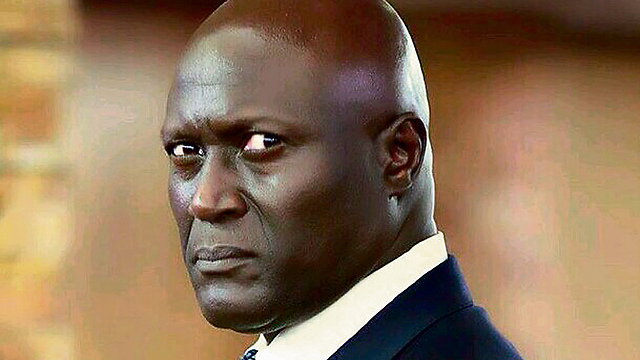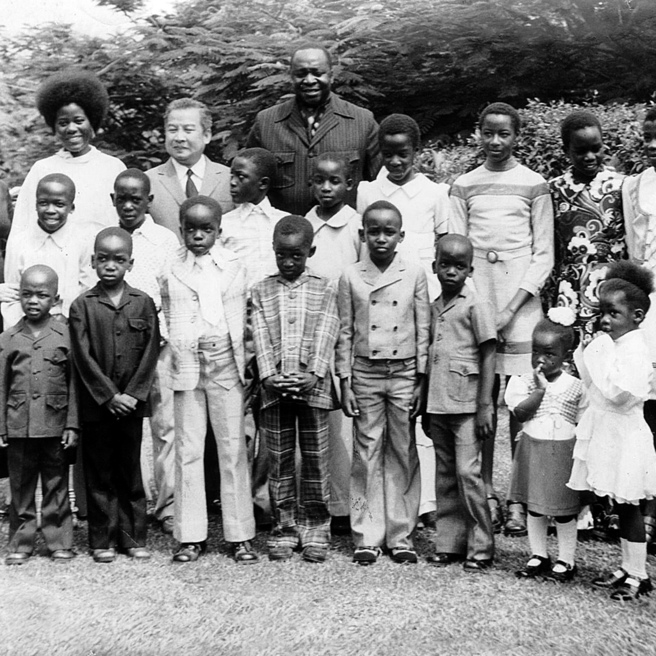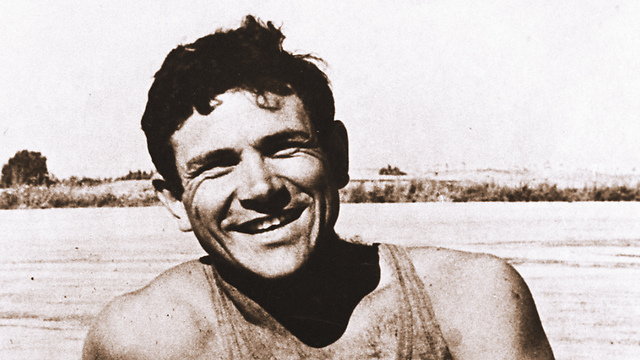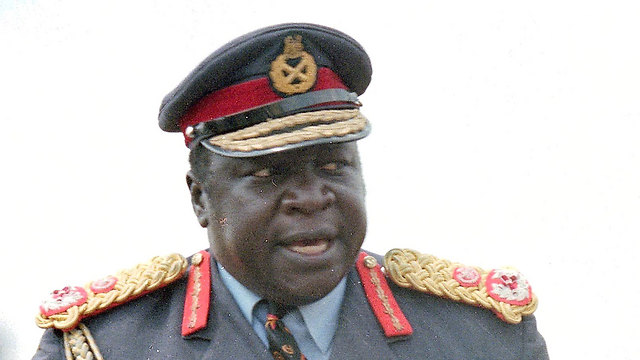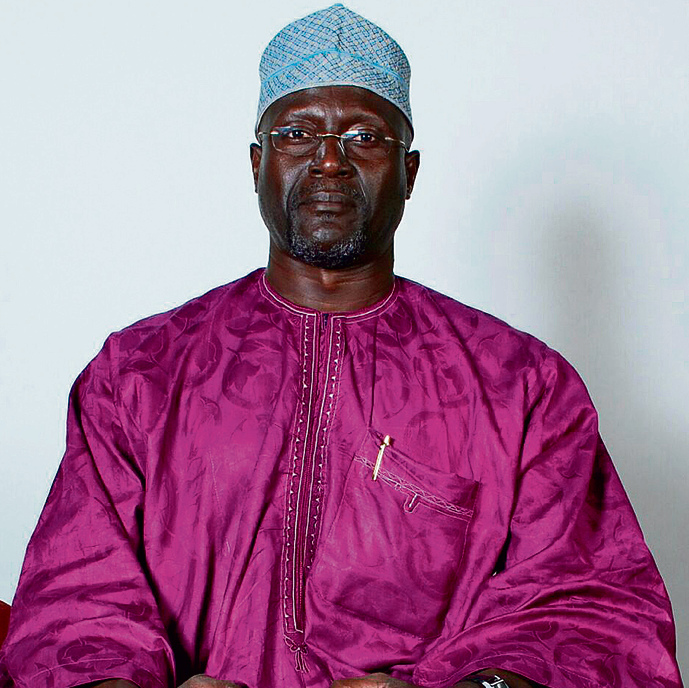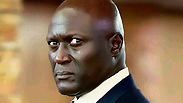
Idi Amin's son: 'My dream is to meet with Entebbe victims' families to apologize'
He was raised by one of the most notorious tyrants in history, but the son of Ugandan despot Idi Amin wants to come to Israel with a conciliatory message: 'I have a list of the five Entebbe victims from Israel, and I want to meet with their families to say sorry,' says Jaffar Amin.
Jaffar Amin, the son of Uganda despot Idi Amin, was only 10 years old when Israeli commandos stormed the old terminal in Entebbe, rescuing the passengers of a hijacked Air France flight brought by the Palestinian and German terrorists to the African country. But he remembers the next morning and the reactions from his classmates well.
"We were in school, and I had just come out of the washroom, and one of the boys came and started asking me about my father's titles,” Jaffar Amin recounts. “So I gave him the name 'Idi Amin Dada,' and he said, 'which other names?' And I said there were no other names. And then he started listing my father's titles.”
These titles included “His Excellency, President for Life, Field Marshal Al Hadji Doctor Idi Amin Dada, VC, DSO, MC, Lord of All the Beasts of the Earth and Fishes of the Seas and Conqueror of the British Empire in Africa in General and Uganda in Particular.”
“And I said 'Those are not names, those are titles,’” Jaffar continues. “And then he added the title 'burekazi.' This simply means 'useless' in Swahili.
“Then he brought out the newspaper, and I remember on the front page there was a photo of MiG 21s, the ones that (the Israeli) Special Forces had bombed. And the children gathered around me and were looking at me, and the first thing they asked was, 'Is he killed?' They were asking about my father. The children were asking in anticipation that my father had been killed by the Israelites.
“I was sort of apprehensive at that point, and I said 'No, they just rescued the hostages.' There was a loud gasp of disappointment among the children. It was an elite school, and while the masses were with my father, the elite were always contrarians. So you could feel the sense of disappointment among them."
There is a reason this story has stayed with him since. The name Idi Amin, the dictator who massacred his own people (the number of Ugandans murdered by his regime is unknown but is estimated at anywhere between 80,000 people to half a million), evokes strong passions all over the world. But for Jaffar Amin, the Ugandan despot was just "Father." Even today, at the age of 50 and with his father dead these past 13 years, Jaffar still speaks of him with reverence.
"My father was very tough with us but also loving and embracing," he says.
Jaffar is the seventh of the 50 children Amin fathered with his seven wives. Jaffar's older siblings are Taban Amin, followed by Mariam, Maimuna, Ali, Farida, and Anite Babi. In Jaffar's younger years in Uganda, most of his father's children and wives lived together on one compound.
"Every holiday, (my father's) G II Gulfstream Learjet (a private jet —ed.) would fly to London, Dubai or Jeddah (in Saudi Arabia) with lists of all of the children's sizes in shoes and clothes (and bring us presents)," he says.
"Our family had a certain ability to feel comfortable in any environment, a superiority complex à la Muhammad Ali. It was a certain kind of high self esteem. We gave Africans the mark of self belief."
Jaffar remembers that when his father returned home, he'd take off his uniform and put on "a casual Mexican white shirt, khaki chinos, and Sudanese sandals or a tracksuit."
His father, Jaffar said, had "a powerful presence" and would sometimes fall into "brooding silences."
‘Limousine trick wasn’t as clever as Israelis though’
In 1979, dissent within Uganda and Amin's attempt to annex a province in Tanzania, which led to war with the neighboring country, brought his eight-year regime to an end, forcing him to flee into exile to Libya and then Saudi Arabia, where he lived with four of his wives and 43 of his children until his death in 2003.
Amin's two eldest sons left his side ("one joined Gaddafi's Islamic Legion where he served as a fighter pilot, and the other was sent as a diplomat to Morocco and the UAE"), making Jaffar one of the closest people to his father.
"My father always said the best protection can only come from within the immediate family, and that is why he kept close only the offspring he could trust. When we got to Libya, I was 12–13 and stayed close to my father until the age of 18. I was his cook, messenger, banker, driver, and bodyguard. I had direct access to his love and affection, and I was in a unique situation in which I could ask him direct, and at times prodding, questions."
Jaffar also spoke to his father about the Entebbe Operation, in which Israeli commandos stormed the old terminal in Entebbe to release over 100 Israeli and Jewish hostages. The daring operation entailed traveling to Uganda in Hercules planes while flying under the radar so as to not be detected; dressing up as Ugandan soldiers and riding a Mercedes made to look like Amin's car to deceive the enemy; taking over the terminal and killing the terrorists; destroying the Ugandan Air Force fleet; and finally, rescuing and returning the hostages to Israel.
On their way to the terminal, the raid force encountered two Ugandan soldiers. Instead of ignoring them and driving on as initially planned, Sayeret Matkal Commander Lt. Col. Yonatan Netanyahu ordered to shoot them. The gunfire drew the attention of the Ugandan soldiers stationed at the airport, leading the Israeli commandos—in the Mercedes limousine and two Range Rovers—to speed towards the terminal. On their way into the terminal building, Netanyahu was shot by a Ugandan soldier, likely firing from atop the control tower, and was fatally wounded. He succumbed to his wounds even before the hostages were rescued.
Do you remember what your father told you about what happened in Entebbe?
"He had gone to Mauritius to handle the chairmanship of OAU (Organization of African Unity). Then he got a phone call, he got information from his ambassador in Lesotho, Maj. General Isaac Lumago, a Christian from the same tribe, warning him of an impending attack because the deadline (that the hijackers had set for their demands to be met) was, I think, the very next day. So he rushed out of the OAU meeting after presenting and took off."
“My father explained to me that (the Israelis) knew people in Uganda, and that there was a long suspicion that people in Uganda have been compromised.” This meant, Jaffar says, that the Israeli Hercules pilots knew exactly how to fly into Uganda in a way that allowed them to stay below the radar.
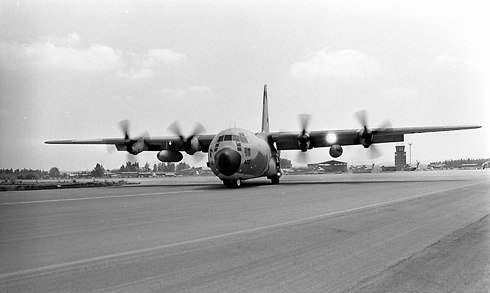
"The planning was very Israeli and very thorough, but the idea to use a limousine was not as clever as they thought, because the (Ugandan soldiers) knew the cars (that accompanied Amin’s Mercedes). That's why, if you check your information, they requested them to stop. There is a procedure that is normally done.

“One of our cousins, who was at the top of the control tower, is the one who actually managed to injure the hero Yoni Netanyahu. (Our cousin) died from the return fire. If you see the pictures, there's a lot of pockmarks on the control tower where the Special Forces (fired and) managed to kill him."
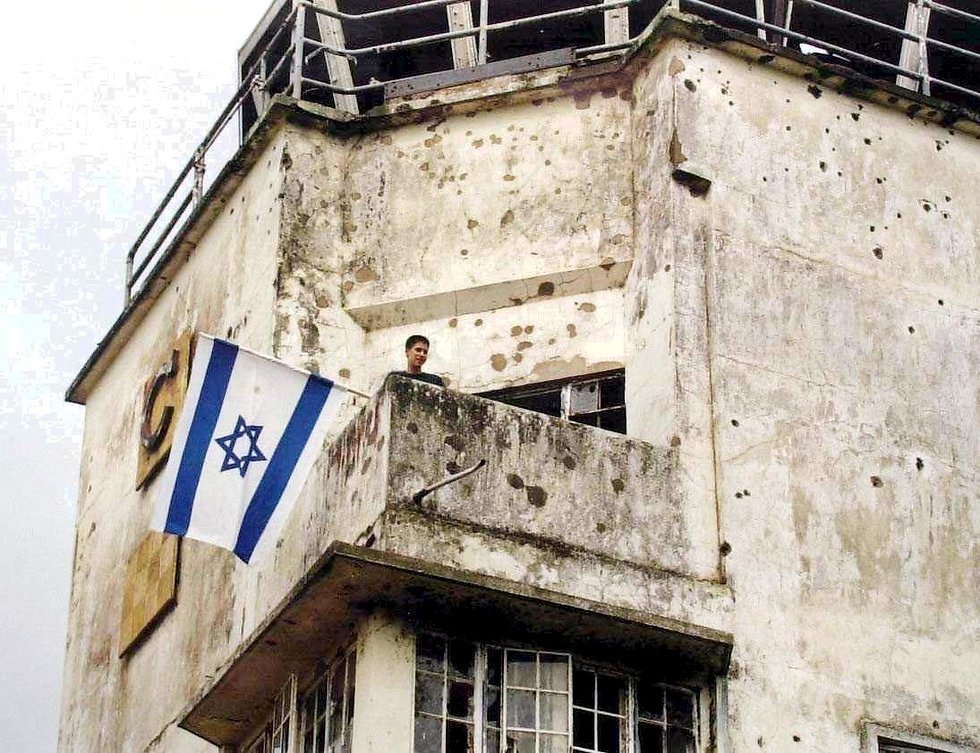
Jaffar Amin—a tall, broad-shouldered man with a lot of self-confidence and a deep voice—is similar in appearance and sheer presence to his father. When he was 18, he went to study abroad in Leicester in England, where he kept his identity private ("My father would write me letters, signing them 'Abu Faysal'") and in 1990 returned to Kampala, the capital city of Uganda. He is married to Lady Zaitun Tiko bint Mustafa Al Sabit Issa Dimba, and they have been "blessed with one beloved daughter and five wonderful sons."
In recent years, he has been the unofficial spokesman of the infamous tyrant's family. Jaffar has had a complicated relationship with his father's legacy. After the release of the movie "The Last King of Scotland," in which Forest Whitaker portrayed his father and even won an Oscar for his role, Jaffar claimed the movie had done his father a great injustice and only served to strengthen his negative image. He called for the establishment of a commission to investigate the darkest time in Uganda's history and claimed his father had been tried and convicted by public opinion and never received a fair trial. In 2010, Jaffar released a book titled "Idi Amin: Hero Or Villain?" and nowadays he organizes activities to encourage coexistence, reconciliation, and dialogue between Muslims, Jews and Christians.
"Since 2007, I've been doing reconciliation with anyone who had animosity or who were antagonists of my father, whether politically or ethnically, because in Uganda, in Africa, it's mainly ethnic problems between tribes. And I realized the uniqueness about the Jewish issue because, whether we like it or not, Jews are considered the first fruit, the chosen people. You're considered higher than most people. Then I realized there's been animosity between the children of Abraham. Personally, I identify with Hagar, Abraham's second wife, because she represents Africa."
And while Jaffar defines himself as a Muslim, he says, “I tend to look at the unifying factors rather than the ones that divide. I realized that if we focus on Abraham, we can find unity in a lot of the problems we have in the world.”
He notes that asking for forgiveness is the most important thing for him.
“I have a list here of the five victims from Israel: Yoni Netanyahu, Dora Bloch, Ida Borochovitch, Pasco Cohen and Jean-Jacques Mimouni. People always focus on the great hero Yoni Netanyahu, but my dream was to meet with all of their families and apologize. I'm one of the 50 children of Amin, and I felt that if I took a stand, it’ll mean something symbolically.
“It's a personal journey for me. I am taking ownership of my name. People with big names normally shy away from their names. But taking ownership of my name involves coming out in the open and declaring who I am and also going and sincerely meeting the victims, wherever they are. And I believe that by coming out and doing this and actually having the courage to go to Israel—if that dream can become a reality—for me it would be the ultimate pilgrimage.”
Did you ask to meet with Prime Minister Netanyahu on his visit to Uganda?
"He's having a very short visit. He might be here for only six hours, and I was feeling that the best way for me was to come to Israel.”
Jaffar has already met with Israel’s ambassador to Kenya, Yahel Vilan, twice and asked to visit Israel and meet with Netanyahu. Vilan passed on the request, but has yet to receive an answer.
If you get to meet with the families of the victims, what would you say to them?
"I generally say, 'I am the son of Idi Amin. You might have emotionally negative views about the man, and I recognize this and try to empathize and feel the pain of loss that you feel.’ This despite the fact that on our side, 20 soldiers had died, and then two Germans and five Palestinians. Despite that loss, it is important for somebody to at least stand up and have the courage to say sorry.”
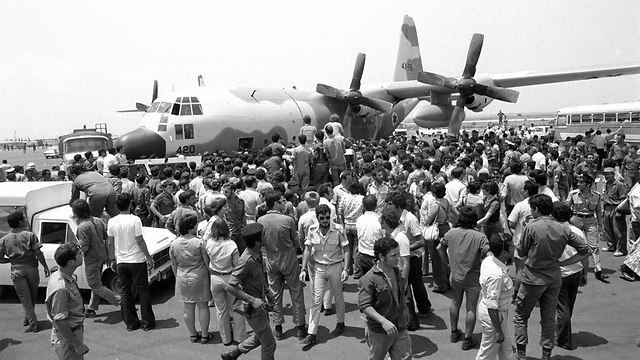
Do you take responsibility for your father's active role in the hijacking of the plane? He actually gave the hijackers permission to land in Entebbe. Perhaps merely an apology would not be enough.
"Let me put things into perspective. Remember that (the hijackers) had actually gone to Benghazi? That should've been their final destination. But then Gaddafi realized the complexity of the situation and sent the plane onwards to Uganda. My father's role was out of loyalty to the (Palestinian) cause. He bore the brunt of the problem from that point onwards. I’m not a politician; I’m just trying to explain what happened. I wish to restore the love and relationship he had with Israel. The thing that (draws) me to Israel is the love with which my father talked about it."
Do you think he made the wrong choice in turning his back on Israel?
"Faith is blind. We believe in an unseen God, so naturally faith is blind. He chose Islam and stood by it to the very end. He got caught up in the Isaac and Ishmael problem. There is a (territorial) battle between the children of Isaac and Ishmael—the Arabs and the Hebrews. Anyone who gets in the way of that issue gets burned. It is such a huge historical issue. At a personal level, I feel what happened in Entebbe should never happen again. And that's where the apology comes from. Let's learn to say sorry to each other."
Are you angry at the Israel for killing 20 Ugandan soldiers and for handling the issue with force rather than diplomacy?
"The fact that my father managed to release all of the foreign nationals and even escorted them all the way to Kenya shows he had the willingness to negotiate. He was naive enough to think he was an honest broker, a go-between. But historically, Israel has never negotiated with terrorists, so it was a no-no from the beginning; the only option would have been the military one.
"You see, the Israelites, from the time of Joshua and David and Samson, have always been warriors. When you've taken their people, you should expect the worst from them. The whole world respects you for that. Yes, there’s resentment, but there’s grudging respect.”
Will you be disappointed if you are not allowed to come to Israel?
"Coming to Israel is a dream. When you wake up from a dream, you don't really feel disappointed. But when it happens, it's amazing. I'm not putting all my hopes in it, but it would be a wonderful dream that has come true.”
Rescued by Israeli paratroopers
Much like his relationship with his son, Idi Amin's relationship with Israel was very complicated. At the beginning of his career, in the 1960s, Amin, along with other officers from African nations, participated in an IDF parachuting course. He never finished the course but received the parachutist's badge, the jump wings, which he proudly wore throughout his time in power.
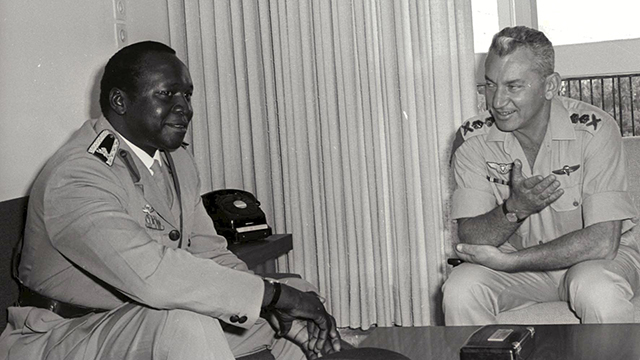
In 1966, when Israeli prime minister Levi Eshkol and his wife visited Africa, strong bonds were forged between Israeli politicians and military officials and the Ugandan army. Later on, Israeli experts aided in the establishment of the Ugandan Air Force and the Israeli Solel Boneh construction company built structures all over the country—including the airport in Entebbe. Amin even went on an official visit to Israel as the president of Uganda.
In 1972, after Golda Meir refused to sell Phantom planes to Amin's regime, he expelled all Israelis from Uganda, cut diplomatic ties between the two countries, and even claimed to have sent a special Ugandan task force to fight against Israel during the 1973 Yom Kippur War.
After Amin's ouster, the new Ugandan government returned the body of Dora Bloch to Israel. Bloch, one of the Entebbe hostages, choked on a fish bone and had to be taken to the hospital. She was murdered there on Amin's orders after the rescue mission. Official ties between the two countries resumed in the 1990s after President Yoweri Museveni, who has been in office since 1986, came to power.
In recent years, the two countries have grown ever closer. Security cooperation has resumed, including arms deals, cooperation in the war against terror, the exchange of intelligence, and Israeli companies operating in Uganda. Israel even helped Uganda rebuild its Air Force, and in return Uganda has agreed to take in hundreds of African migrants who had illegally entered Israel.
When Jaffar is asked about his father’s position on Israel, the legendary stories come up. One of Idi Amin’s paratrooper friends in Uganda told the son of a training session they had in 1963 or 1964. “He jumped off the plane at the Gulf of Aqaba (the Gulf of Eilat, though the IDF claims Amin parachuted at Palmachim Beach, while some say he never jumped at all —IE). While modern parachutes can be maneuvered, he had an old one that couldn’t be. The wind pulled my father, and he landed in the water, and the parachute started pulling him downwards.
“The IDF paratroopers sent one of these rubber dinghies to come and pick him up and managed to get him. When they pulled him out, the other paratroopers, those who landed well, said my father had a very far-away look, like life had just passed before his eyes when he almost drowned. Because of his abilities, and the way he survived drowning, the Israelis gave him the jump wings. He used to wear them all the time, even when he was against Israel. I'd want to meet that rescue team."
Would you say what happened in Entebbe helped usher the end of your father’s regime?
"A year before (the operation) he’(d) done an amazing thing—the UN resolution 3379. It was his resolution that equated Zionism—not Israelites, not Hebrews, but Zionism as an ideology—to apartheid and racism. The resolution passed, and he gained strength from that. He was in a euphoric mood; he thought he was solving the Arab-Palestinian problem, only for humiliation to come the very next year... for (Israel) that attack was a way to say, 'We're going to nip this man in the bud.'
“The height of his power was in 1975 as the OAU chairman, and then came the humiliation of 1976, when everybody suddenly realized he's not as tough as his weapons purport him to be. That was the point of no return. And then the actual last nail in the coffin was in 1977 when the archbishop (of Uganda) was killed (on Amin’s orders —IE). So from that point onwards, it was a decline."
In his final years in Saudi Arabia, did he say anything about Israel? Did he have regrets?
Jaffar says Israel was "an obsession" for his father, and the operation was "a bittersweet lamentation."
"Let me tell you an amazing story," he starts. "It involves the death of his mother, and he always repeated it in his lamentations. On July, 27, 1969, his mother went into a coma. When she came out of a coma, she had Israeli doctors in front of her.
“She thanked the Israeli doctors and then turned to my father and said, 'Never forsake the children of God.' It was almost like a warning before 1972 (the breaking of ties with Israel —ed.). That was when he still had strong ties with Israel, and all the doctors were Israelis. She warned him, and that's what he was lamenting about in Saudi Arabia (in his final years), always. It was almost like he had a lost love in his life."
Jaffar says his father told his Palestinians friends that “the difference between you Palestinians and the Israelis is that Israelis would always have your back. But you, you'd rather stab somebody in the back. But the best way to fight against Israel is in a frontal attack. For them to see you coming, and then it is a battle. But you Palestinians always want to stab them in the back.
“He felt the Arabs lost wars because with (terrorism), you go against the public. But a war is honorable. Conventional war is when somebody attacks, and everyone knows the sides. It's almost like a football game. But (terrorism), out of the blue damage and killing, has never had an honorable touch to it.”
Training with Palestinian fedayeen
Naturally, Jaffar supports the Palestinian struggle for recognition, but his placatory nature color his views on this issue as well. "I identify with the (Palestinians') right to statehood and believe the two-state option should be explored, as it is supported by the UN. I (have) also believe(d) in Israel's right to nationhood since 1948," he says. "I know coexistence is unpopular in Israel, but I urge the far right to believe in coexistence. Jacobite Israelis and Ishmalite Arabs have a 5,000-year right to live in coexistence in the Holy Land.”
Is it true you've trained with Fatah terrorists in the past? Have you ever participated in military activity?
"I didn't, of course, serve in the Ugandan army, I was 10 years old in 1976 (when we left Uganda); however, way back we did firearms target practice, from 1975 to 1979. In 1980, we were training with Palestinian fedayeen in Jeddah (in Saudi Arabia), including hand-to-hand combat commando training. That was before they had to evacuate the Palestinian mission in Jeddah following Saddam Hussein's invasion of Kuwait.”
You said Gaddafi was like a father to you.
"There are three types of fathers in Islam. Your biological father, your father-in-law, and your patron who takes care of you. Gaddafi was my patron, and we were welcome in his palace. The last time I saw him was in Tripoli. He gathered 1,500 African cultural leaders and children of former heads of states of Africa in September 2009 to celebrate his 40 years in power. I am still grieving his death to date."
Are you interested in going into politics, like your father?
“No. I decided to set up the Al-Amin Foundation in 2009 to foster community reconciliation and community transformation through agro-business commercial farming—like the kibbutz in the Holy Land—all across Africa.”
What would you say to Israelis who see your father as a bad man who made terrible decisions?
"My father was a soldier's soldier Any Israeli would understand that because you go through military training. There's a time when you need to put down the weapons and pick the shears to plow the fields. Most soldiers don't know how to do that balancing act. Israelites would understand him for what he was, a soldier.”
There are rumors you have two siblings in Israel; is that true?
“My father Idi Amin Dada always spoke about having twins in Israel from an Israeli mother. I don’t know their names, and I don’t want to hurt their privacy, but I’d want to meet them.”










